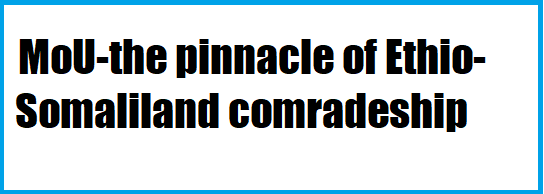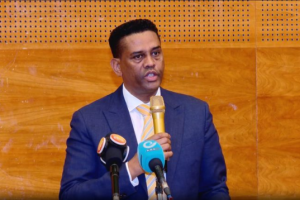
Over the years despite the twists and turns have been positioning itself as an anchor state spearheading regional cooperation and the diplomatic hub of the continent. It has been entering joint accords to forester regional development in the Horn. The efforts have paid off connecting the region with road networks and energy. And, lately, the country has been pushing regional cooperation for sea access.
Since recently ending its internal woes peacefully and independently, Ethiopia has been showing itself and standing shoulder-high on the world stage. And, the nation is still working on following the same path that places the country at the heart of diplomatic relations.
Again, the Government of Ethiopia called its entire neighboring nations to cooperate in economic, political, and social aspects for mutual interests. Realizing its dreams, Ethiopia has opened itself to a win-win approach so that parties can benefit. In fact, Ethiopia is a landlocked country with the nearest proximity to the sea. So, the nation calls all coastal nations to work cooperatively in order to let Ethiopia access the sea on its own.
Speaking of accessing the sea, Ethiopia, with the highest population, has been encountering multiple challenges for the nation has no sea access. In this regard, the nation opens itself to any agreement that can make both parties a winner. Ethiopia always shows its eagerness for any win- win approach with any nation.
Trying so hard, Ethiopia recently signed a Memorandum of Understanding (MoU) with Somaliland to access the sea. In return, Somaliland gets some major share from the Ethiopian flag career company, Ethiopian Airlines. Such agreement witnesses that Ethiopia has done anything to spearhead regional cooperation.
Ethiopia and Somaliland started their relationship decades ago. In 1991, Somaliland declared its independence once again and has since then been practicing democracy for 30 years by holding a series of elections and peaceful transition of government. Some countries, including Ethiopia, have opened a consular office in Hargeisa. Nevertheless, Somaliland has not yet received full recognition. Despite this, it has signed agreements with various countries, including agreements for port development, said Government Communication Services in a statement lately.
An MoU that was signed enabling a 19% share of Berbera port for Ethiopia with other partners is proof of this fact. It is also known that other countries are following the same process. Yet there has been no murmur or complaint when this materialized. The recent MoU that has been signed which enables Ethiopia to gain a military base and access commercial maritime services through reciprocity and through a lease agreement is basically the same.
“There has been a longstanding cooperation agreement between our country and Somaliland. The recently signed comprehensive memorandum of understanding for partnership and cooperation reflects efforts made by the two parties to further strengthen their friendship and respond to the historic questions of both parties. It will also facilitate a strategic partnership in a sustainable manner based on clear details and transparency.”
Consultations and negotiations on mutual benefits have been going on with Somaliland for months now. Therefore, a Memorandum of Understanding has been signed for the benefit of both parties. This document gives Ethiopia the opportunity to obtain a permanent and reliable naval base and commercial maritime service in the Gulf of Aden through a lease arrangement, and according to the government’s announced position, it allows Somaliland to derive an equivalent share of the lease from Ethiopian Airlines. Beyond that, it also includes provisions for the Ethiopian government to make an in-depth assessment towards taking a position regarding the efforts of Somaliland to gain recognition.
“The natural endowments that our region is endowed with are more than enough for all of us. It is not possible to create a better tomorrow by denying cooperation under the veil of insecurity or wickedness. The agreement with Somaliland is a demonstration of the government’s belief in achieving Ethiopia’s aspirations through cooperation with its neighbors, through the principle of reciprocity, and through peaceful means. This opportunity is open to all and remains open”
No party or country will be affected by this MoU. There is no broken trust nor are there any laws that have been transgressed. While this is a fact, it cannot be said that some will not be offended, shocked, and refrain from attempting to destroy the positive progress, the statement added.
For social science experts, the country’s accord with Somaliland is a continuation of its amicable foreign policy and not a farfetched move to breach others’ sovereignty, social science experts said, stressing the need to secure a seaport in a fiercely contested region.
Commenting on the issue, the experts slammed doubts and supersized interpretations of the Memorandum of Understanding (MoU) for Partnership and Cooperation between Ethiopia and Somaliland while describing the agreement as valid and reciprocal actions that would serve the entire region.
Accordingly, Dilla University History and International Affairs analyst Abdu Mohamed (Ph.D.) told The Ethiopian Herald that the country has not reinvented something new and its agreement with Somaliland is part and parcel of its three decades of foreign policy towards Hargeisa,
Ethiopia and Somaliland have been forging commercial and other diplomatic relations devoid of external reactions and standpoints. “And, Ethiopia needs to view the ongoing reactions carefully from diplomacy and peace perspectives,” the analyst recommended.
Sharing the above rationale, Hawassa University Law Instructor Fekadu Deriba, stated that as Ethiopian Airlines have been flying to Hargeisa and the country has a share in the Berbera Port, the recent MoU is not a new phenomenon. “It is normal for two parties to seal a mutual agreement so long as it does not affect others.”
“Ethiopia needs to study the reactions following the signing of the MoU carefully and craft appropriate response mechanisms and continue to create clarity. No external entity should dictate Ethiopia as to when and with whom it should enter into agreements. It is up to Ethiopia to decide on its foreign policy, Fekadu said, adding: “The country’s quest for access to the sea is historical, legal and geopolitical. Its interest can be achieved through various means. A mutual agreement is one path.”
For Hawassa University Political Science and Philosophy Instructor Awel Ali, Ethiopia’s quest is purely economic and reciprocal and its agreement with Somaliland is neither invasion nor violation of sovereignty.
Expressing the rationale for Ethiopia’s aspiration to sovereign access to the sea, the expert said, “Most of the time threats or attacks are coming from the sea, and having direct port access will enable the country to freely import the armament that needs to protect its security.”
Awel recommended that the agreement should be followed by concrete actions by all involved parties. “Both parties need to work more on the details and translate the accord into action.”
BY DANIEL ALEMAYEHU
THE ETHIOPIAN HERALD TUESDAY 9 JANUARY 2024




